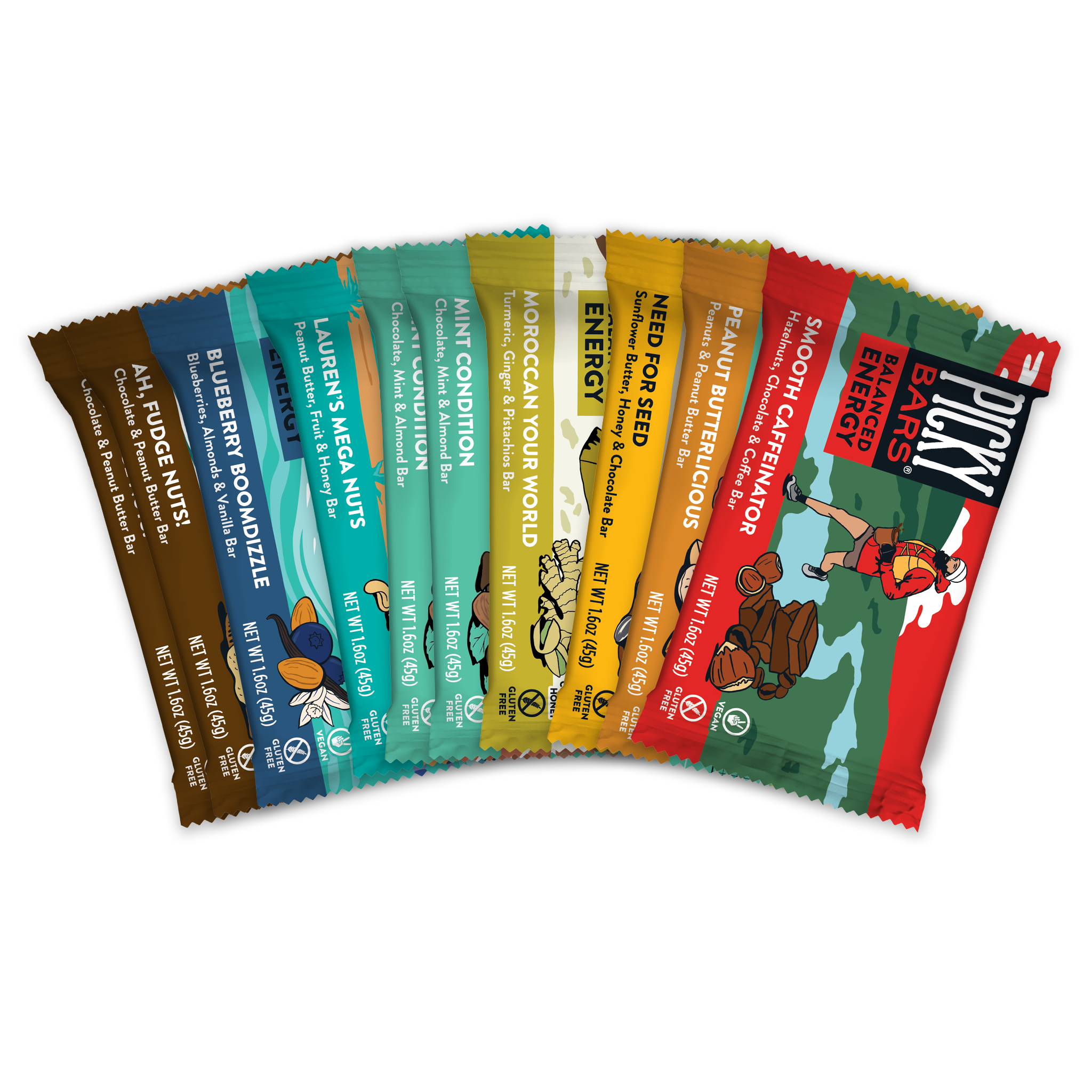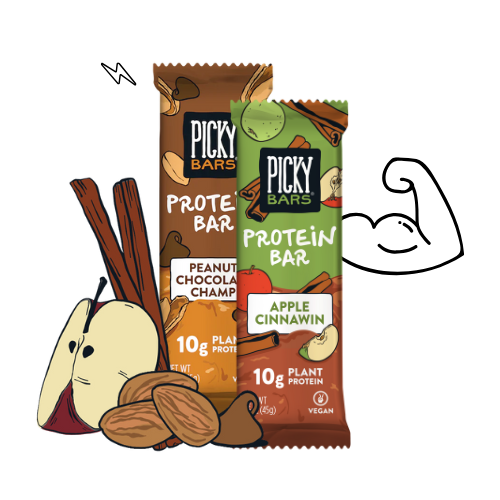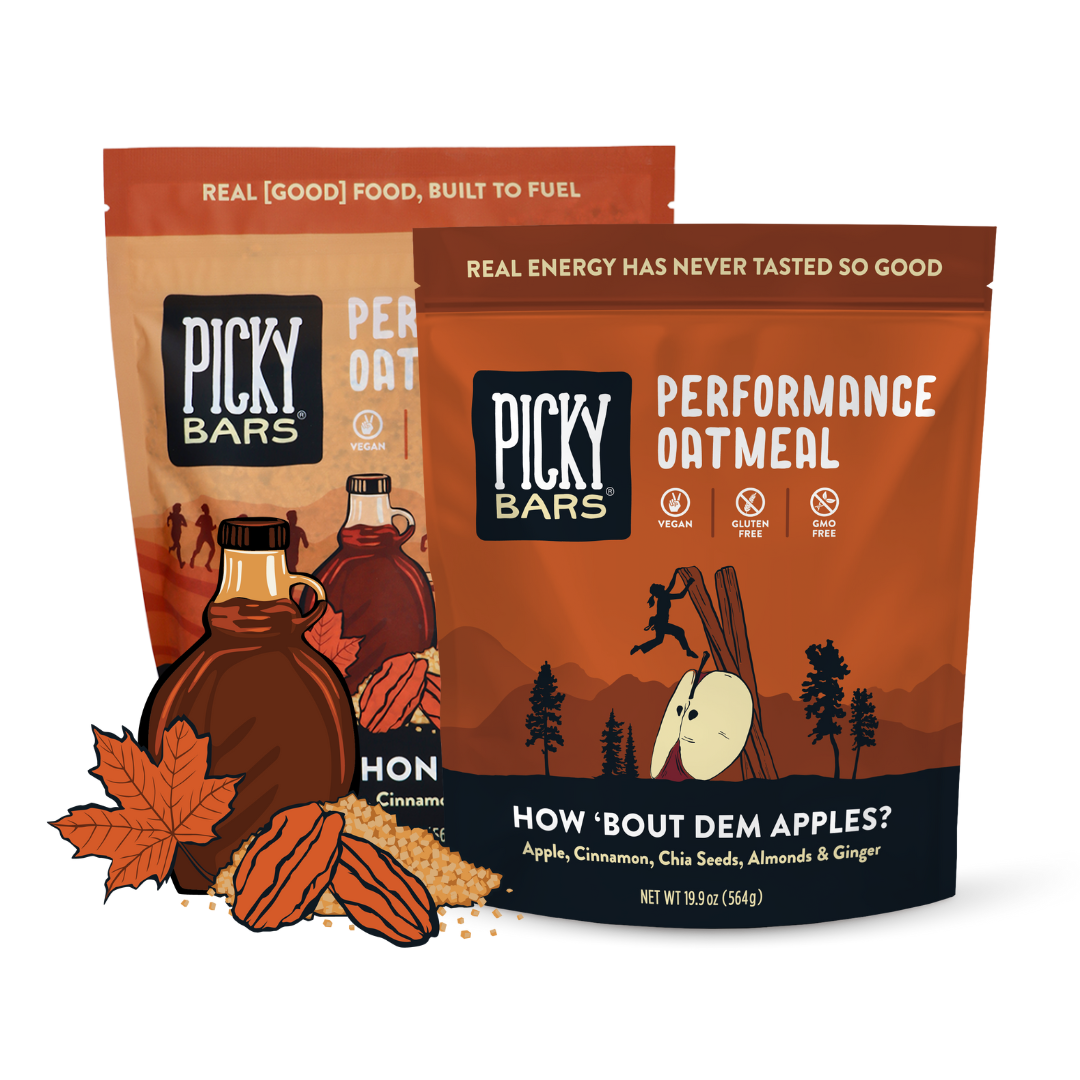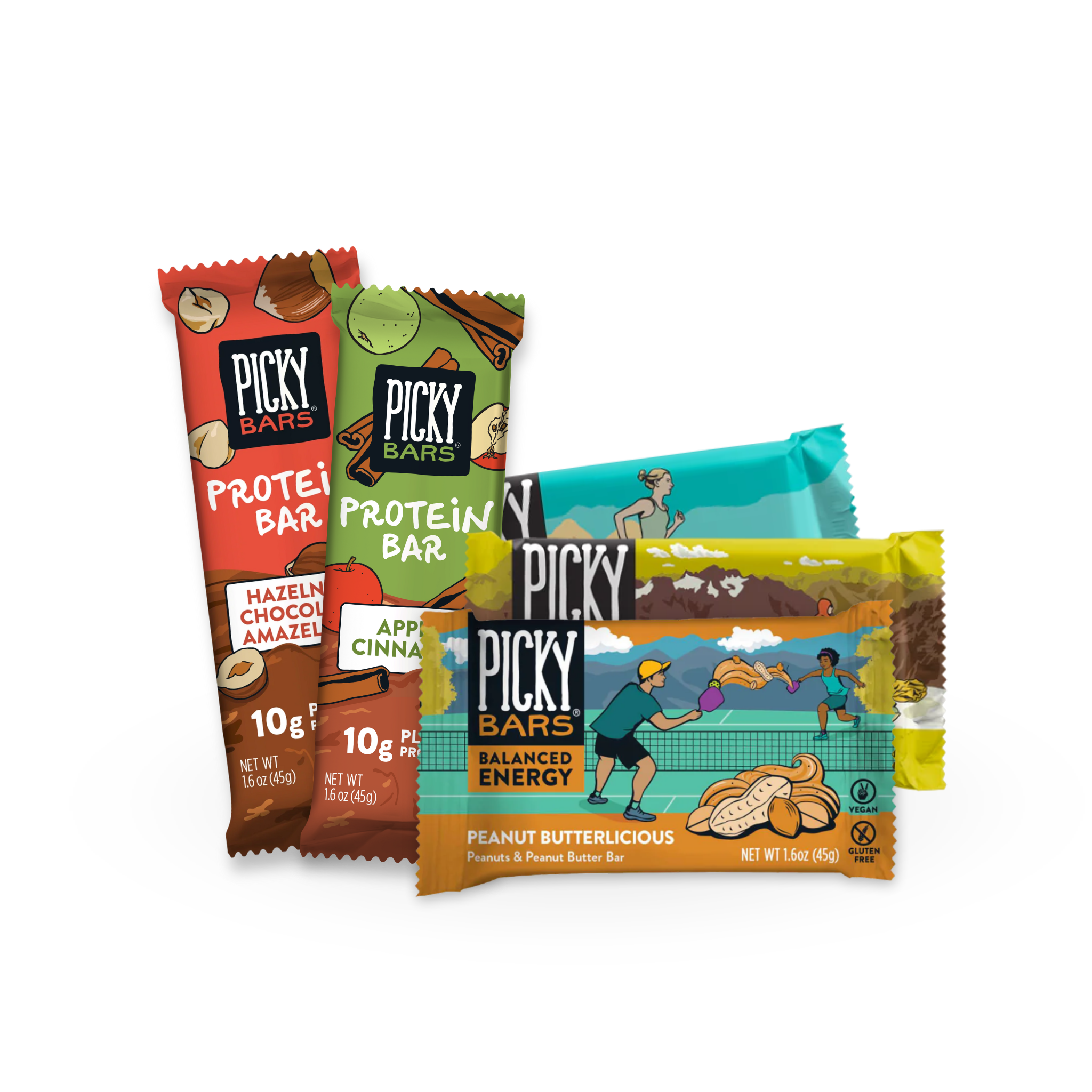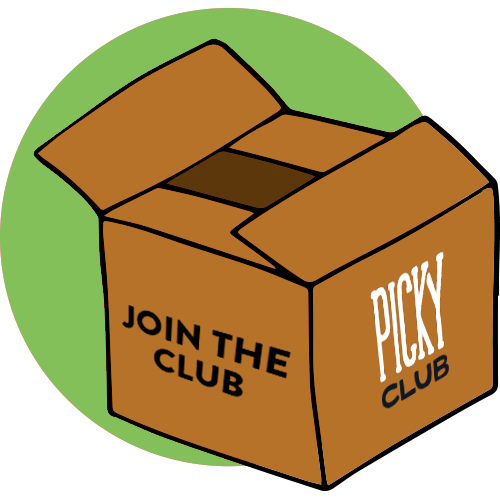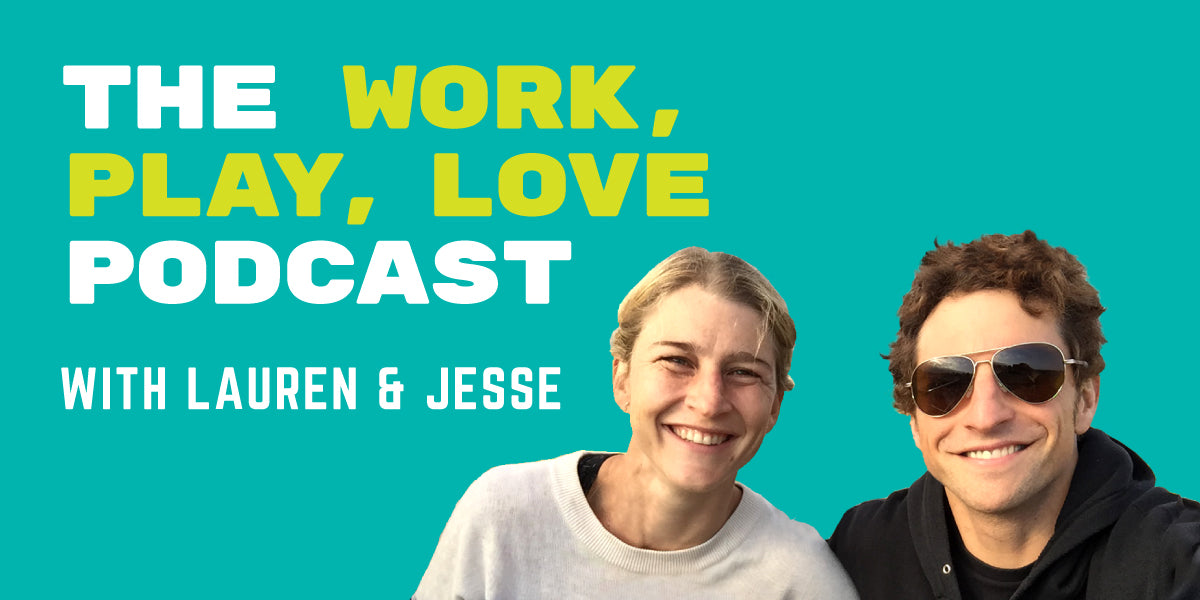

· By Sarah Conklin
37: Mental Toughness, Sugar Demonizing + more
Juggling work-life balance can be a real three-ring circus, which Lauren & Jesse know first hand. Led by listener questions, this new podcast is all about sports, biz, and family. [ASK YOUR QUESTION]
37: Mental Toughness, Sugar, Recovery Strategies, Pushing for Business Growth
iTunes | Spotify | Google Play | Stitcher
Description:
Jesse and Lauren are just starting to thaw out from the winter, and the signs of spring are accompanied by a mixed bag of emotions for the Flomas’s. Lauren’s got an exciting year building up for Wilder, and Jesse—with a recent injury—is finding that the plans for his year are changing. Today’s show dives into hard-to-answer questions. How do you push through mental fatigue during a race? How does Picky Bars decide to follow (or buck) food trends like sugar avoidance? What’s the best way to recover from play? And when do you decide to take your business to the next level vs. letting it settle in so you can spend more time with family. Jesse and Lauren tackle those questions and more.
What's Goin' On:
Jesse and Lauren share some exciting news for the pod—the show has its first sponsor! Long-time partners of Jesse and Lauren, Jaybird, is supporting the show. Jaybird makes sweatproof wireless earbuds for athletes. Jesse talks about the brand, and about his current favorite Jaybird earbuds, the Run XT.
Lauren’s pumped. The snow is melting. She’s been having fun running and skiing. And she’s getting ready for several Wilder events coming up this year. She talks about Wilder Labs, 4-day events for Wilder Retreat alums to dive deeper into the practices in smaller groups. The two events for this year are already sold out, and Lauren talks about the process of introducing this new retreat.
Jesse shares news that he just received—he has a stress fracture in his navicular bone. The revelation is a major let down after a strong half-marathon performance in Portland. Jesse talks about how he feels, just having learned of the injury, and Lauren shares stories of similar injuries she and her athletes have sustained.
Warm-up laps
17:21 - Hi Lauren and Jesse! With all the many ways we can measure our running (mileage, pace, heart rate, etc.) what do you think is the most effective?
L: This feels like a trick question! But I start with mileage or time spent on my feet. Then pace and heart rate come next—how am I spending that time on my feet? How much time am I spending in threshold heart rates vs. recovery heart rates vs. VO2 Max heart rates? But athletes don’t always have access to a physiological test that determines their heart rate zones, so I use a combination of pace and heart rate after mileage.
J: I use pace and mileage for the most part. I never really translated heart rate to running. But to be fair, I probably intuitively listen to my heart rate and the amount of effort it takes during a race or workout.
20:53 - Do you ever find yourself prepping for a snot rocket only to realize it is not socially acceptable? Such as walking across the grocery store parking lot or watching your kid play in the park? Or is it always appropriate if done correctly?
L: Just yesterday, I had just come back from Nordic skiing. I was in the parking lot with tons of people. And I was sitting in my car with the door open, cooling off. I just went right ahead and launched one into the parking lot! Tons of people around. As I was doing it, I did wonder if it was appropriate. Here’s my answer: if you’re among endurance athlete people? I feel comfortable with it.
J: Maybe not during your indoor biking class.
L: Yeah. Definitely not indoors.
J: I’ve caught myself doing it in public a lot because it’s just so automatic. And I do catch myself and look around to see if anyone saw it. It’s probably not socially acceptable, but it’s probably OK so long as you’re outside.
23:01 – My family and I are coming to Bend this summer! What are some "must-see" running/biking trails and Bend-like things we should do while there? The hubby and I plan to each have a day to run and/or bike a long run/ride and so we each need to fill kiddo time when solo parenting. Swimming options? Parks? Good family hikes?
J: Awesome timing on this question. We just put out a Bend Adventure Guide at Picky Bars. It’s got our favorite trails, great places to eat, and lots of suggestions for things to do around Bend. Check it out!
L: There are so many awesome things to do here. Visitbend.com is a great resource. Tumalo Falls is a must-see. Rock Ridge Park on the east side of bend is also fun for kids and adults into mountain biking.
25:51 - Do you have any recommendations for heart rate monitors, and/or the care and feeding thereof? I ask because I've owned probably half a dozen chest strap heart rate monitors over the past decade or so, and without fail, they've all gone bonkers on me within a month or two.
L: You want to make sure you’re getting a good connection, and ultra-sound gel is a good way to do that. So give that a try.
J: Chamois Buttr makes an ultra-sound gel called buh-bump.
L: I also prefer the old-school Garmin heart rate monitors with the hard plastic straps. They just seem to work better. The fabric straps that are more bendy just aren’t reliable.
J: I agree—was going to say the same thing.
L: I don’t know whether you’re a man or a woman, but I know that sports bras and certain material shirts can cause electro-static issues with heart rate monitors—that’s been my experience. I don’t have hard data on that, though. But you might try switching shirts/bras and see if that helps.
The Meat and Potatoes
28:30 - I was wondering if you could talk about mental toughness both during training and races. I can physically run through just about anything (I ran a half marathon with a labral tear in my hip, ran two different half marathons with a broken foot, etc) but when I just get tired, I really struggle to push through and keep running, keep up my pace, etc. Any suggestions?
L: To me this sounds nutritional. If you’re getting fatigued, you’re probably running out of fuel. So I would make sure you’re fueling properly before you set out on your runs.
J: I’ve definitely bonked during races and also experienced legitimate dehydration, and they can certainly cause fatigue—so I agree, it’s important to make sure you fuel and hydrate correctly. But there’s also mental fatigue. In the past, when I’ve experienced discomfort during a race, I was able to deny the pain—to basically not acknowledge it. And that got me pretty far. But then I made another breakthrough. It happened during deep tissue massage. If you fight the deep tissue massage, it doesn’t work. You tense up. The specialist can’t get to the deepest part of the muscle and cause it to release. I had to learn to accept that discomfort for what it was and mentally experience it and know that I was going to be OK.
L: Yeah this has Buddhist roots—re-channeling your reaction to pain. When you experience pain, instead of having a reaction of shame, or trying to push it away or deny it, you let it come in without judgement. And then you give it another path to pass along on its way. If you let it in and don’t attach to it, you’ll be able to let your mind focus on other things for a while.
J: The other thing that has worked well for me is projecting forward to the next segment of the race. Seeing yourself getting to a point in the race, and then getting to that point as quickly and efficiently as possible, and then doing the same for the next point and the next—that’s how I approach it. I find that’s helpful compared to “Oh wow, I have four laps to go and I’m feeling tired…I have so much left to do.”
L: Another important piece of this is that you have to really care about this. You have to be really excited about your goal in order to be able to reach that point and then decide to keep going—decide to use the tools that Jesse’s talking about. I’ve experienced in my own running that on the days that I care, I pull out my tools and I push hard. And other days—I don’t feel like it and I don’t do as much. So I think you really need to think about your goal and decide if you really care about it. If you don’t, think about setting a different goal!
37:53 - I was surprised to see that the Picky Granola, which I was super excited to try, has added sugar. It’s not that I don’t eat sugar — I do. But because I like sweets, I try to avoid added sugar in the staples of my diet. Can you talk about how you decide when and how much sugar to add to your products? Balancing health + taste + business practicality? And your own personal practices around sugar consumption? Thanks for making rad products and your transparency!
L: Avoiding sugar is certainly a trend right now. And so it’s something we think about when we’re creating new products. The temptation is to say “we’re not going to put any added sugar in this” to make sure that it’s on-trend. But we’ve just never done that at Picky Bars. We make the products how we like them, how we want to eat them. A little bit of added sugar—4-5g of added sugar in a serving helps with the texture, and it also helps with the reaction when you cook the granola. So we like it. And I think that a little bit of added sugar in the greater context of complex carbs, healthy fats, protein—when it’s all together, that’s the best way to have sugar in your diet. I’ve moved away from trying to separate out sugar as a “treat” because I don’t like to think about food that way, and I don’t think my body thinks about food that way.
J: I think sugar has been demonized a lot over the past few years. And in some ways? Rightly so. You look at diabetes and obesity rates, and you see these really bad macro trends happening here in the US. And those are driven, in large part, by highly sugarized products. For me, my personal nutritional philosophy is that we are animals that are programmed to eat a combination of the three major macro nutrients. And we eat a little bit of everything. So the way I feel I can be most consistent and sustainably healthy for myself is to eat a range of fats sugars and proteins. And that’s how we approach it at Picky Bars—a healthy balance is good. It helps you avoid super restrictive diets.
L: If you can avoid psychological games with food, it frees up a lot space in your brain. But it takes work to have a healthy psychological relationship with food. We all have work to do on this front—we’re all subjected to marketing and societal pressures around body type.
J+L: Plus, many of these trends are trends, and a lot of brands just jump on the bandwagon to capitalize on the moment. As a result, the grocery store aisle is not necessarily the best place to learn about healthy nutrition. Still, this is something we think about a lot, and it’s an active discussion at Picky Bars.
49:40 - I recently finished Christie Aschwanden's book "Good to Go" which explores the scientific backing (and lack there of) surrounding the countless sports recovery techniques used by athletes. Both of you are mentioned in the book, but I am curious about your general philosophy when I comes to optimizing your recovery. Which recovery modalities (e.g. compression boots, ice baths, massage, etc.) do you like using and which do you think are pointless?
J: Sleep, sleep, sleep is the most important form of recovery, I think. I’ve tried some of these other methods, but nothing tops sleep in my opinion. The other thing I do is a very, very light workout—like a spin where you keep your heart rate under 100 bpm.
L: I’ve been told that super-light recovery can be helpful. But as a runner, I never felt like I had an option. Of course, I didn’t think of taking a walk. Walking was offensive to me! But of course it’s a great way to get low-intensity movement in your day. Also, having kids and living with them can get you moving around pretty well. Good to Go is an awesome book. I really recommend it.
What do I believe in now? I agree with Jesse: sleep. I prescribe that to my athletes. Sleep and proper nutrition—timing meals—are really important. I also think that icing can be really effective when you need to pony up for a race, or if you have back to back events. But it’s not great as your only and long-term solution for recovery. In the end, I think any of these techniques can be helpful, but it’s less about the specifics of what you do, and more about actually taking the time to rest and recovery—that’s what’s important.
56:15 - I run a small food related business that I started myself. Over the past 5 years it has been growing steadily to the point where I don’t have to work 100 hours a week (turnover is just under 1 million dollars). I feel at a crossroads now however whether to expand and really try to push the business to where it can go or play it safe and stay in our current holding pattern. However, I also am a dad to 2 young kids (5 and 1 year old girls) and while I consider myself to be a very motivated individual I find myself happy that after 5 years of really hard work, it’s nice to take some time where I’m not pushing so hard for constant growth or trying to set sales records all the time etc. But on the other hand I feel like I’m disrespecting the opportunity I’ve created for myself by building this business in the first place. I guess I’m just recently feeling unmotivated in my business. But that drives me crazy because I know I should always be jacked and motivated. How do you guys stay motivated to keep pushing growth with so many other balls in the air (sport,kids, each other etc) and also when you come to these crossroads in business, such as the creation of the PBJ product, how do you arrive at that decision? Do you have a process, or how does it work?
L: I don’t know that Picky Bars is really even at a place where we’ve had to make decisions like this yet. We’re still growing, we haven’t hit that crossroads. That said, I think it’s about weighing what’s on offer at your business and what you’re missing with your family. You can’t make the days longer, you can’t make this time happen again (for your family OR your business), but you can have a holding pattern for your business. And I don’t think that’s always detrimental. You can’t put a holding pattern on your kids. So this is a tough question!
J: I agree with what Lauren said. I am really having to weigh, with Picky Bars, how much time I want to invest in the company vs. my family. And it’s a really tough question. But I do know that I don’t want to miss out on my time with my kids. I don’t want to be putting in the 100-hour weeks for the next four years. But Picky Bars isn’t at a place where we can just let it settle in, either. We’re not big enough yet. So I’ve decided that I do want to grow, but that I want to grow with me simply working full time at Picky. But the growth will be limited because I’m not going to be putting in those 60-80 hour weeks. It’s a similar decision that I made when I decided that I wasn’t going to pursue being world-champion at Kona.
L: I think you’re on the right track. I think it’s just about setting a goal, and then deciding whether you want to do what it takes to meet that goal. The only thing I would say you might consider changing is this belief that you “should always be jacked and motivated.” That’s not true.
J+L: It’s normal to feel a progression or a departure from a goal you had a long time ago. And this podcast is all about being passionate abou the balance of Work Play and Love. You get to decide the priority. It’s not about “shoulds” or societal pressures or gender stereotypes. It’s about what you feel is going to be best for you. So everything you’re feeling is completely normal.
Follow-ups
1:08 - Follow up #1
Jesse, congratulations on your win, and thanks for the honesty about your insecurities with body image. I dealt with bulimia in high school and college, and though I've been "recovered" for a few years, I still have similar insecurities. I especially feel them now after some extra weight I've gained since having a now 1-year-old.I feel like this lesson extends to so many other areas. The feeling I had when I learned that I could pass people that looked skinnier and more like runners than me is the same feeling I had when I learned I could test higher than more vocal and smarter-looking guys in my math classes.
1:09 – Follow up #2
I was listening to your podcast recently - re: going into a race not at your best or a little undertrained. I think it went under "setting expectations." I ran the LA Marathon Sunday and it was by far my slowest marathon (4:28! My slowest prior to that was 4:09, 6 years ago I ran a 3:34 - LOL, how?!?), but my expectations were entirely different than in the past (i.e. I only expected to finish, and not much more than that). It was my first marathon in 6 years, and I just wanted to prove to myself I could do it again. Training was "meh" at times; I often didn't track pace (bc I don't need that kind of judgement from myself in my life right now!) and went with the "done is better than good" philosophy. I know you mentioned finding people in the race who are just out there for fun -- that is SO true. Let me tell you. The party people are running in the 4:30 marathon group. There's barely anyone looking at watches, so many walk breaks or stretch breaks (many taken by yours truly), no one is jostling at the water stops (because most everyone is actually STOPPING for them rather than trying to run through). If you can check your ego and be cool with a possible personal worst (or, as I like to see it, my personal record in terms of length of time running), you can still enjoy a race. It actually wasn't miserable at any point on Sunday. This is also the best I've been able to walk after a marathon, so there's that, too. When you can shift your frame of reference, not compare yourself to the past, and really be honest about your training and goals, you can still have fun even with a personal worst! Hope that helps some of your listeners!
1:11 – Follow up #3
Follow up to Ep 36--Re: taking and break and coming back. Your response to this question could not have come at a better time for me. I am 11 months postpartum and while I have completed a few short distance events (5ks and 10ks) I have been scared (yes, I said scared) to attempt anything longer. Scared to compare my old times to what I might be able to run now-despite actually seeing training runs be the same or faster than before baby. I so appreciated your advice to the question asker to "meet themselves where they are at." I think this applies postpartum, post injury, post break, as we get older, etc. There is a lot of discussion about being "present" but sometimes we (I) don't think of this in context of athleticism. Thank you for always being honest and down to earth. I so look forward to hearing your podcast each week. PS I'm okay that they have been getting longer :). PPS After listening to Ep 36 I decided to register for an upcoming half marathon--here's to meeting myself where I'm at.
1:12 – Follow up #4
Peroxide in ears (episode 35)! So fun to hear my tidbit advice on the podcast even though Jesse was LAUGHING the whole time! 🧐😜 But at least you said you’d try it! Tell Lauren it’s legit! She should’ve tried it with that beastly infestation of sickness recently! I’m glad she’s on the mend & love listening to you both. My husband is an MD (orthopedics & internal medicine), and he happily submits to the hydrogen peroxide drip! 🤣Anyhow, I meant to send links with my initial remark: Scroll down about 1/3 to Stopping the Flu: Your Ears. Cheers to health!
As always, submit your work/play/love question at pickybars.com/workplaylove - Thanks for listening!

[ PAST EPISODES + DESCRIPTIONS ]

